Local SEO is inevitable for businesses. What about if they have a presence in different locations? SEO agencies ought to build visibility for all the places and need to bring them together on the same brand. When you are handling local SEO strategies for all the locations, it should be added complexity to managing consistency.

Why is local SEO for multiple locations important?
As seen in businesses with multiple locations, you need to find the nearest one to the users when they start searching. For search engines to display the nearest one to online users, all the locations should have their search presence.
For start-ups, every business location needs a dedicated page on the site. Moreover, each location needs its own Google Business Profile, directory listing, etc.
First, we will discuss local SEO ranking factors. We might not talk about all elements, but we will discuss three factors for local searches.
Relevance
- How well your local business profile is relevant to the user search?
- What is the distance for each search result from the location used in the search?
- Your website also must have blogs, reviews and links
Keyways to optimize local SEO for multiple locations
You might have different competitors in each location, so analyzing to work on SEO for various locations is important. Although you might not be competing with your industry-related local brands, it is necessary to understand their multi-location strategy.
Know your competitor
- Identify your local search competitors’ ranking for the exact target keywords
- Focus on your competitor’s keywords for chances that you have missed out
- Find their local rankings – You must include positions and placements like maps
- You need to know the competitor’s distance in your location
Understand competitor’s business profile
- You must check the gaps in their profile and other facilities.
- Scrutinize their sites and take down key elements that they have, like content, schema markup, etc.
- Analyze competitors’ backlinks and citations and check where they get links and other references.
- Consider the above elements to communicate effectively with your customers.
Create a Google Business Profile for all the locations
It would help if you created a Google Business Profile for the promising multi-location SEO. This process requires logging into Google Business Profile Manager and going to the Create Group.

After completing the log-in process, you can add business locations. You will see an option to add a business, and then there are two options: Add Single business and Import businesses.
You should choose the Select Import Businesses option, and then you will be asked to submit a spreadsheet with all your business information.
Once you’ve named your group, you can start adding business locations. Click the Add business button to see two options: Add single business and Import businesses.
- Location code
- Name of the business
- Business Address
- Area
- Latitude and longitude
- Mobile numbers and Landline
- Business Website
- Business Category
- Opening hours and closing hours
- Business center photo
If you complete this process, you must select the file in Google Business Profile Manager to upload all multiple locations. If there are more than 10 locations, you can request bulk verification.
When you have each page’s business profile, you need to maintain every profile up to date.
Create a location page for each business center
Your website should have a dedicated page for each business location. And each one needs to have the following.
- Title tags should contain location keyword
- Meta description must contain the location
- Heading and content should have location keywords
- Address, business name and phone number
- Business hours
- Change content on the same page rather than keeping the same
- It should apply to images and videos
- Google Maps embed
Optimize for local keywords
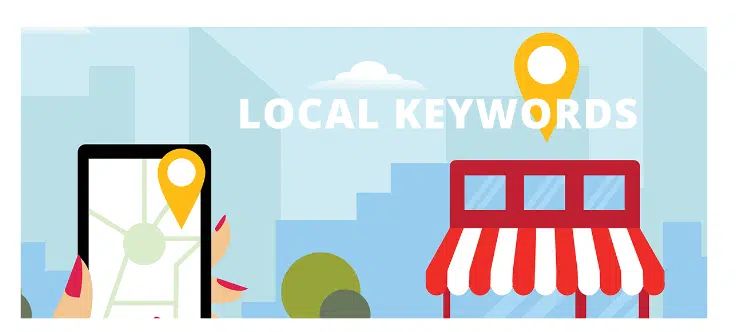
Local keywords are required for two essential purposes:
- To optimize your location pages
- Developing localized content
For the multi-location brand, you should be able to target the right keywords for each premise. SEO experts can handle it well as they know keywords used by audiences.
Explicit local keywords
High-intent searches will have primary keywords such as brand, product names and services. In addition, location will also play a key role, like the phrase “near me”. E.g., “South Indian Food in India” and “Andhra Restaurant”
Implicit local keywords
You need to remember that people don’t always use location while searching; instead, they use keywords related to the services they want, such as “pipe repair services” or “plumber services.” So, you should ensure that you won’t overlook implicit keywords.
Informational local keywords
Sometimes, users might include additional qualifiers instead of searching regular keywords like “The Best South Indian Food.”
Develop localized content
When you produce localized content, it can reinforce your local presence for search engines and help local users. Keyword research can guide the informational queries you look for an address, and you can also develop localized content to display your part in communicating your location.
SEO companies should produce localized content for all your locations to help local users.
- Upload blogs on your products or services
- Post location-based queries
- Include localized FAQ sections to location-wise pages
- It is better to sponsor and participate in events that are taking place in your location
- Local promotions can help you reach more and more users
If you promote content on third-party sites, you can increase mileage
Design your internal linking structure
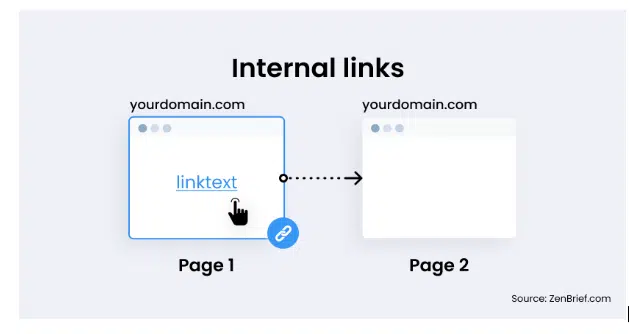
When you build internal links, they help search engines understand the structure of the site and its web pages.
If the structure is proper and the internal linking system is done correctly, it is easy to reinforce the vitality of the pages and the relationship between them by adding more internal links. You can do this with blogs and landing pages. When you want to get apt results for multi-location SEO, international links are needed as they will group and connect to location pages with the site.
Apply schema markup
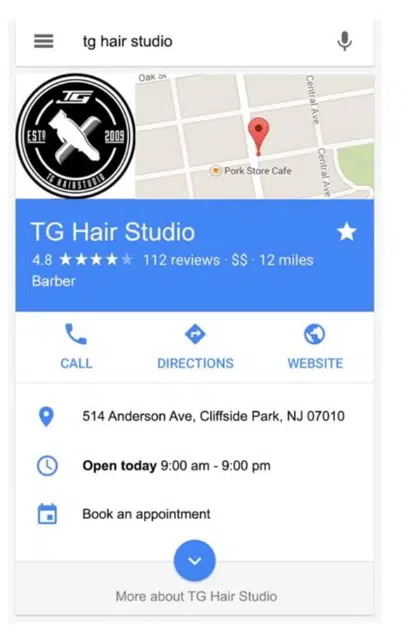
Schema is vital for structured data in Google Search. Structured data can add comprehensive code to your pages and descriptions to help Google understand them and rank for related queries. Google will also display the listings in formats that are accessible to users.
For instance, using Local Business Schema markup, Google will display local business listings that include required information such as business hours, directions, mobile numbers, etc.
Let’s look at the three essential benefits of using structured data:
- Make Google understand the content that you upload on the site
- Make CTR with rich results
Support the users to wrap up the action easy and fast
When you use Schema markup, you have a good chance of getting rich results in SERPs. Besides standing out visually, quality results can help provide relevant information to users so that they can complete the action faster.
Structured data not only delivers quality results that lead to higher conversions, but it also shortens the distance between initial clicks and conversion actions. For example, Google may display site links in your result, including a link to your business center page – making it effortless for users to find their nearest branch, enhancing their experience and speeding up their actions.

Get local backlinks for each location page
Backlinks are said to be one of the crucial factors for ranking, but the difference with local SEO is that you need to get local backlinks for your local pages.
As we know, backlinks and citations can boost prominence, but local backlinks will add relevance to the specific location of the business.
Let’s look at some action plan for getting local backlinks:
- The SEO experts should check competitors’ link profile
- It is necessary to create your profile with local directors
- Taking part in interviews for local publications is needed
- Keep your brand noted in local regions
- Chasing up for citations and should request the backlinks
Getting a publisher link to your site is an outstanding achievement for your overall search presence. You need to reach out to linking sites and keep the intended URL, but it will rely on them to keep it in the work.
Handle your citations
Citations can be vital for local SEO. They might not be as valuable as backlinks, but they are most important and simpler to get. Their value stacks up if you are creating a large profile of citations.
Building citations in selected areas is essential as you run a multi-location business and want to create local citations for your target regions.
- Bing areas for business
- Apple business connect
- Directory listings
- Review platforms
Using a citation management tool helps you maintain track of citations, find inconsistencies and reveal duplicate and other false or problematic citations. It is the key to success.
Managing your reviews
User reviews on the site can convey a strong message and create a better reputation for search engines. In addition, it will play a vital role in the ranking factors. The sign of positive reviews would be 3.8 stars, which should be a high volume of reviews.
Volume matters as search engines cannot decide on half a dozen reviews. According to reports, users want to choose your business-rated reviews of 3.8 stars from 300, so maintaining customer reviews is crucial.
Besides reputation, reviews are essential because when you get negative reviews from users, you can turn them into positive ones by handling them appropriately.
Evaluating the success of your local SEO strategy
Optimizing for local SEO can help businesses, but there should be a proper strategy for getting results. Based on your marketing goals, you should analyze the analytics and work on it.
- Whether users are finding your local business in search engines
- Are you getting customers based on searching online?
- Is your Google Business Profile getting the attention of users and generating traffic?
- Which location is getting a good response in local search among all the places?
- Which location is getting enough searches?
More than a single analytics is needed to get answers to all these queries, and Google Business Profile has enough reporting systems that will give you insights into each location where you run the business.
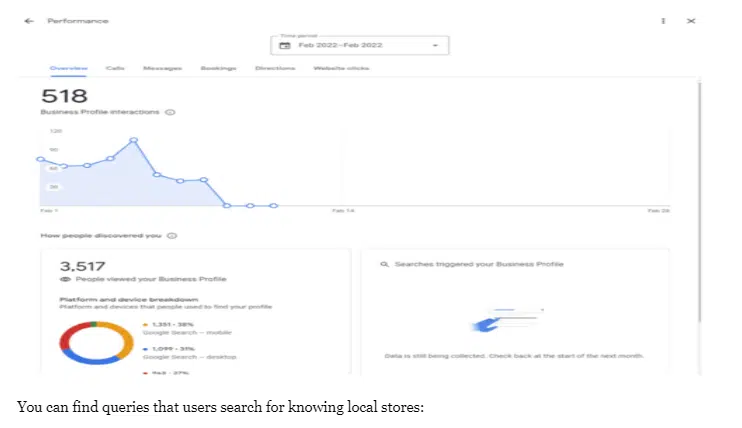
You can find queries that users search for knowing local stores:
- Go to your Google Business Profile
- You should request directories to store the location
- Website clicks from the business profile
- Messages by Google Business Profile
- Menu engagement
These insights are particular to certain stores, but you need to know what the right Google business profile can do better. It might be good, but it won’t give you the complete picture, particularly for multiple business addresses. To get comprehensive details, you need to use different sources. Be it Google Business Profile, Google Analytics, Google Ads, CRM data, or many others.
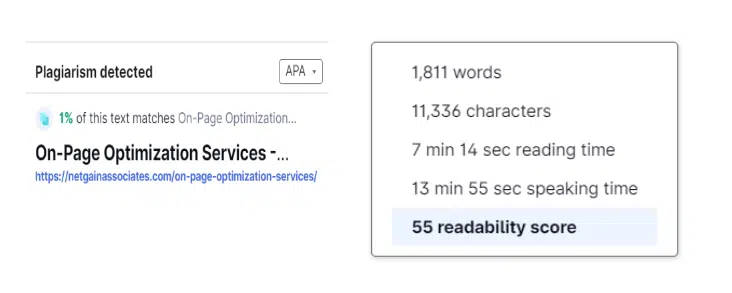
Frequently Ask Questions
Why is local SEO important for businesses with multiple locations?
Local SEO is essential for businesses with multiple locations because it helps them rank higher in local search results, making it easier for customers to find them when searching for nearby services or products. This boosts visibility, drives foot traffic to each location, and ultimately increases sales and revenue.
What are the critical components of a Google Business Profile for each business location?
A Google Business Profile includes:
- Business name, address, and phone number (NAP)
- Business category or industry
- Hours of operation
- Website URL
- Reviews and ratings from customers
- Photos of the business
- Google Maps location pin
What's the secret sauce to enhancing the local presence of each business location?
Localized content enhances the local presence of each business location by catering to the specific needs, preferences, and cultural nuances of the target audience in that area. It can help businesses connect more effectively with local customers, improve search engine visibility for local searches, and foster community engagement and trust.
How can businesses effectively target local keywords for each location?
- Conducting thorough keyword research specific to each location
- Optimizing website content, including titles, meta descriptions, and headers, with local keywords
- Creating location-specific landing pages tailored to each area
- Generating local backlinks and citations from reputable sources
- Encouraging customer reviews mentioning location-specific keywords
- Regularly monitoring and adjusting strategies based on local search trends and competition



















